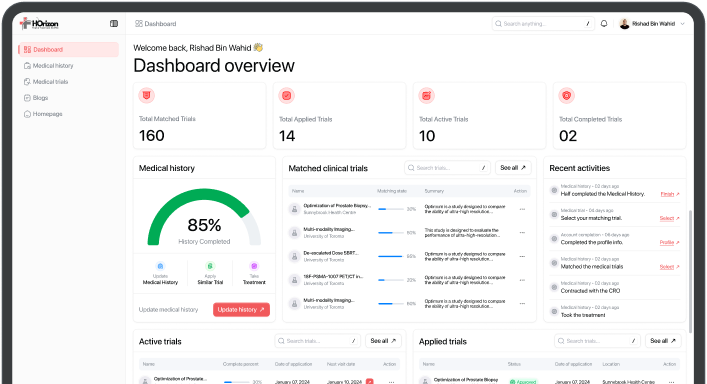Clinical trials are the cornerstone of medical research, offering hope to patients while driving forward the development of new treatments. The best clinical trials are those that provide access to cutting-edge therapies, improve healthcare outcomes, and contribute to scientific breakthroughs. Whether you’re seeking alternative treatments for a condition that hasn’t responded to standard care or looking to contribute to the future of medicine, clinical trials can be a transformative experience.
In this blog, we’ll explore what makes a clinical trial the “best,” why they are essential, and how to find the right trial for your needs.
Why Clinical Trials Matter
Clinical trials are research studies designed to evaluate new medical approaches, from drugs and devices to lifestyle changes and surgical techniques. Every breakthrough treatment available today—from life-saving cancer drugs to revolutionary vaccines—was once tested in a clinical trial.
The significance of clinical trials extends beyond individual patients:
- Advancing Medicine: Trials generate data that drives medical innovation, improving treatments for future patients.
- Expanding Options: For patients with limited choices, clinical trials often provide access to experimental therapies before they are publicly available.
- Informing Care Standards: Results from clinical trials help establish protocols for the best practices in healthcare delivery.
Best Clinical Trials: A Gateway to Innovative Treatments and Breakthroughs
In the ever-evolving world of medicine, clinical trials represent the cornerstone of progress. They serve as the bridge between groundbreaking scientific discoveries and real-world application, providing patients with access to innovative treatments and shaping the future of healthcare. For many, clinical trials aren’t just an option—they are a lifeline, offering hope where conventional treatments fall short.
This blog explores the vital role of clinical trials, their benefits, and how to identify the best opportunities that align with your medical needs and personal goals.
Why Clinical Trials Matter
Clinical trials are research studies designed to evaluate new medical approaches, from drugs and devices to lifestyle changes and surgical techniques. Every breakthrough treatment available today—from life-saving cancer drugs to revolutionary vaccines—was once tested in a clinical trial.
The significance of clinical trials extends beyond individual patients:
- Advancing Medicine: Trials generate data that drives medical innovation, improving treatments for future patients.
- Expanding Options: For patients with limited choices, clinical trials often provide access to experimental therapies before they are publicly available.
- Informing Care Standards: Results from clinical trials help establish protocols for the best practices in healthcare delivery.
What Makes a Clinical Trial the Best?
Not all clinical trials are the same. The best clinical trials stand out for their rigorous design, potential impact, and patient-centered approach. Here are some key characteristics that define the top clinical trials:
- Innovative Treatments: The best clinical trials are focused on pioneering new treatments that could significantly advance medical care. Whether it’s a new drug, a combination of therapies, or cutting-edge technology, these trials are designed to push the boundaries of what’s currently possible in medicine.
- Strong Safety Protocols: Safety is a top priority in clinical research. The best trials are conducted under strict safety guidelines to protect participants. These trials have clearly defined protocols, regular monitoring, and comprehensive oversight from regulatory bodies to ensure patient well-being.
- Meaningful Outcomes: The best clinical trials aim to achieve outcomes that could meaningfully improve patient care. Whether they focus on extending survival rates, improving quality of life, or providing less invasive treatment options, these trials have the potential to change how conditions are managed in the future.
- Patient-Centered Approach: In leading clinical trials, the patient experience is a central focus. This means that participants are treated as partners in the research process, with clear communication, support throughout the trial, and a genuine interest in understanding the patient’s experience.
- Global Recognition and Impact: Many of the best clinical trials are part of globally recognized research programs or conducted by leading institutions. These trials often make headlines and play a significant role in shaping the future of healthcare on a global scale.
Why Are Clinical Trials Important?
Clinical trials are essential for the progress of medicine. Every drug, treatment, or procedure available today has gone through years of clinical testing to ensure it’s safe and effective. Here’s why clinical trials matter:
- Advancing Medical Research: Without clinical trials, there would be no new treatments. Trials are how researchers discover what works and what doesn’t, helping refine therapies and develop breakthroughs that can change lives.
- Providing Alternative Treatment Options: For patients who have not responded to standard treatments, clinical trials can offer hope. The best clinical trials provide access to therapies that are not yet widely available, potentially offering better outcomes for conditions that are hard to treat.
- Enhancing Treatment Safety and Effectiveness: Clinical trials are crucial for ensuring that new treatments are both safe and effective. By participating in a trial, patients contribute to the data that helps doctors and scientists understand how a treatment works and whether it should become part of standard care.
- Contributing to Future Care: Every participant in a clinical trial is contributing to the future of medicine. The data collected helps shape how treatments are developed, refined, and delivered, improving care for future patients and making healthcare more effective.
Types of Clinical Trials
The best clinical trials are conducted across various stages of research, and each stage plays a unique role in developing new treatments. Here’s an overview of the different types of trials:
- Phase I Trials: These early-stage trials test a new treatment’s safety and determine the best dose. They are usually small and involve patients who haven’t had success with other treatments.
- Phase II Trials: These trials focus on evaluating the effectiveness of the treatment and further assess its safety. Phase II trials help researchers understand how well a treatment works for a specific condition.
- Phase III Trials: Conducted on larger groups, these trials compare the new treatment to the current standard of care. If a Phase III trial shows that a new treatment is more effective or has fewer side effects, it may be approved for general use.
- Phase IV Trials: These are post-approval trials that monitor the long-term effects and safety of a treatment once it is available to the public.
In addition to these phases, there are also prevention trials, which focus on reducing the risk of disease, and observational studies, which track patients’ outcomes without assigning them to a specific treatment.
How to Find the Best Clinical Trials
Finding the best clinical trial for your needs can seem overwhelming, but there are resources and platforms available to help. The key is to match with a trial that fits your medical condition, treatment goals, and personal preferences. Here’s how to get started:
- Speak with Your Doctor: Your healthcare provider can guide you toward the right clinical trial based on your diagnosis and treatment history. They’ll help you understand whether you’re a good candidate and what you can expect from the process.
- Use a Clinical Trial Platform: Platforms like Horizon Trials make it easier to find and match with the best clinical trials. Horizon Trials uses advanced technology to scan and filter trials based on your specific medical needs, connecting you with opportunities that fit your profile.
- Consider Your Goals: Think about what you hope to achieve by participating in a clinical trial. Are you looking for a new treatment option? Do you want to contribute to medical research? Understanding your personal goals will help you choose the right trial.
- Understand the Commitment: Some trials may require more frequent visits, monitoring, or testing than others. Make sure you fully understand what’s involved, including potential risks and side effects, before enrolling in a trial.
- Review Eligibility Criteria: Each clinical trial has specific eligibility requirements, which may include the type of condition, stage of illness, previous treatments, and overall health. Make sure to review these criteria carefully to find a trial that’s right for you.
Common Misconceptions About Clinical Trials
Despite their benefits, clinical trials are often misunderstood. Let’s dispel a few common myths:
- Myth: Clinical trials are only for terminally ill patients.
Fact: Trials are available for individuals at all stages of health, including prevention and early-stage diagnosis. - Myth: Participants are treated as test subjects.
Fact: Ethical standards prioritize patient safety, and participation is entirely voluntary. - Myth: Trials are more risky than standard treatments.
Fact: While risks exist, trials undergo rigorous oversight to ensure they meet safety and ethical guidelines.
The best clinical trials offer a powerful opportunity for patients seeking innovative treatments and a chance to contribute to the future of medical care. Whether you’re looking for a new treatment option or want to play a role in advancing science, clinical trials can be a path to hope and healing.
With platforms like Horizon Trials, finding the best clinical trial for your needs has never been easier. Start your journey today and explore the possibilities that clinical trials can offer.

